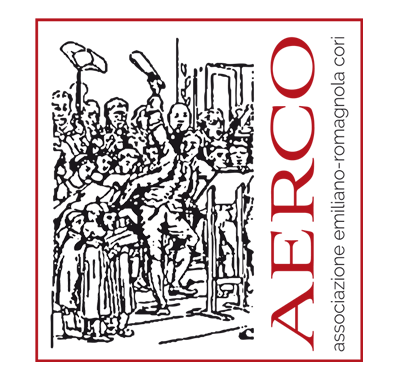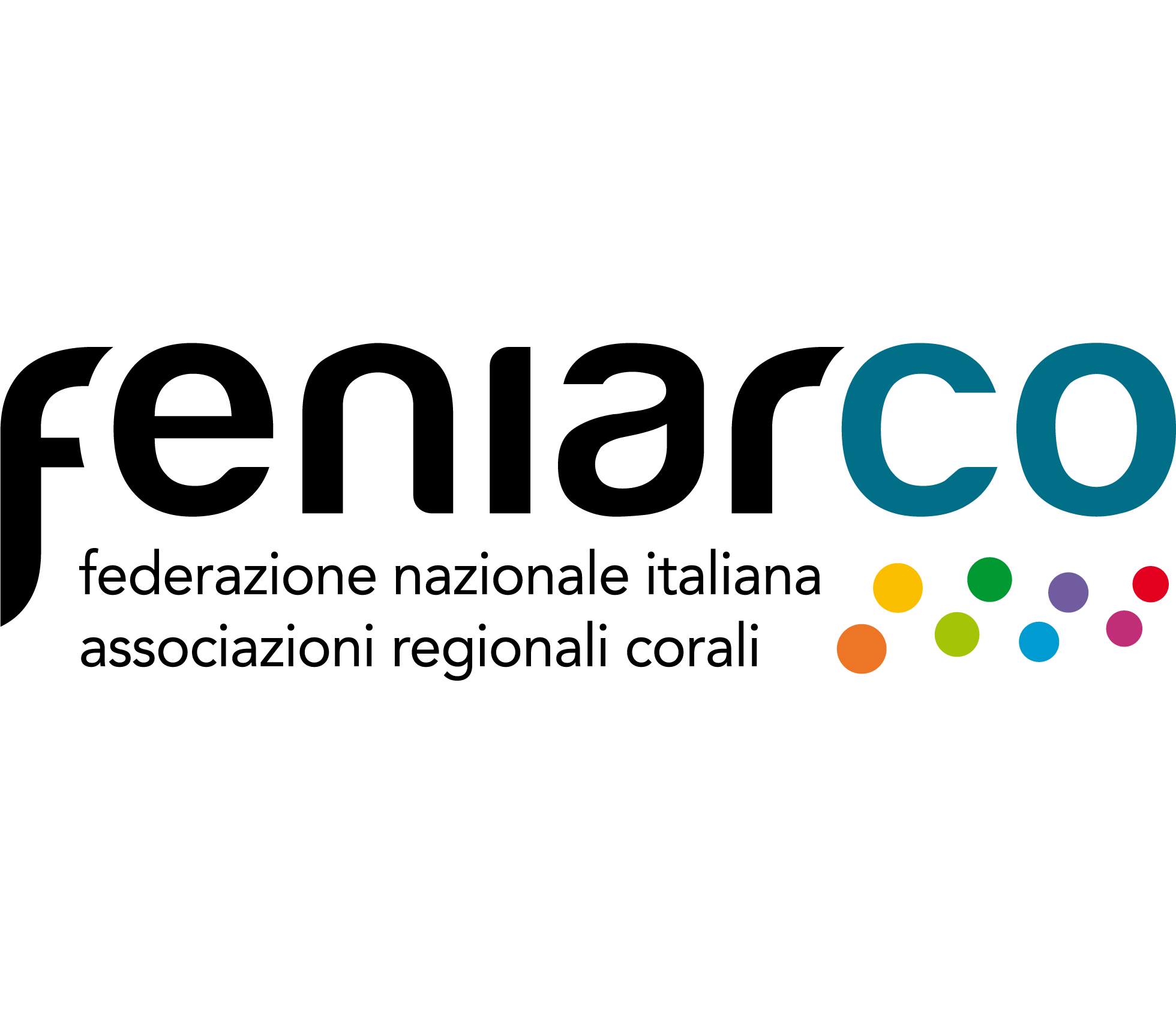Sixth International Competition
for Children’s Choir Composition
CORINFESTA
1.The Associazione Emiliano Romagnola Cori (A.E.R.CO.), together with the Fondazione C.G. Andreoli of the ‘Unione dei Comuni dell’Area Nord di Modena’, with financial support of the Ministry of Culture and of the Region Emilia-Romagna and with the patronage of FENIARCO, announces the sixth International Composition Competition for Children’s and Youth Choirs CORINFESTA with the aim of creating new material to be widely disseminated.
2. Participation is open to composers of any nationality.
3. The competition is divided into two sections:
Section A: Towards Polyphony
a. two voices (SS or SA), no divisi;
b. a cappella or with piano accompaniment and possible small and/or body percussion;
c. of a maximum duration of 3 minutes;
d. the text chosen may be sacred or secular, in Italian (also dialectal) or English or Latin, enclosing the Italian translation; if secular, it must be suitable for the age of the singers to whom this Section refers. It will also be possible to choose one of the texts suggested in the paragraph ‘good texts for good music‘ (*).
e. the difficulty and general approach of the piece must take into account the pedagogical context of a children’s choir;
f. it is desirable to use tools for the inclusion of diversities and disabilities (Sign Languages, soundtracks, …). It will be the composer’s responsibility to illustrate the choices made by means of a dotted or synthetic-discursive legend.
Section B: Many voices, a school of life
a. three voices (SSA or SAT or SABr), no divisi;
b. a cappella or with piano accompaniment and possible small and/or body percussion;
c. of a maximum duration of 5 minutes;
d. the text chosen may be sacred or secular, in Italian (also dialectal) or English or Latin, enclosing the Italian translation; if secular, it must be suitable for the age of the singers to whom this Section refers. It will also be possible to choose one of the texts suggested in the paragraph ‘good texts for good music‘ (*).
e. it is desirable to use tools for the inclusion of diversity and disabilities (Sign Languages, soundtracks, …). It will be the composer’s responsibility to illustrate the choices made with a dotted or synthetic-discursive legend.
4. Each candidate may submit a maximum of two entries (one for each section or two for a single section). Submissions shall be made exclusively via the appropriate online form by and no later than midnight on 31/08/2025.
5. The participation fee is 25 euros per entry.
6. Each work must be sent in PDF format. The composer’s name must not appear on the score. The AERCO office shall receive the scores and send them to the members of the jury. The identity of the composers will not be disclosed by the AERCO office until after the evaluation phase has been completed. The online form shall also contain the following information: a. personal details (name, surname, address, telephone number, e-mail address); b. curriculum vitae; c. a declaration that the pieces submitted have never been published and/or awarded; d. source of the literary text, if any; e. permission to use and publish any protected literary texts from the author or publisher or rights holder; f. performance notes, if any; g. mp3 file obtained from the MIDI of the score.
7.The jury will consist of five composer and choral conductor members. These are their names: John Rutter (UK), Tullio Visioli (Italy), Claudio Ferrara (Italy), Roberto Berzero, (Italy), Gyöngyösi Levente (Hungary). The judgment will be final and unappealable.
8. The evaluation criteria will be: a. quality of the textual treatment; b. overall artistic impression; c. performability: compositional attention to vocal and perceptual requirements.
9. The following prizes will be awarded:
First Prize Winners (one per Section)
– cash prize of € 1,500 (one thousand five hundred euros);
– public and multimedia performance, within 8 months of the announcement of the winners, by two choirs of international significance;
– winners will be ‘composer in residence’ for AERCO throughout 2026. AERCO will select 4 choirs (primarily from among its members), who will have the opportunity to commission the winners to write a piece dedicated to their choir. AERCO will pay the winning composers a sum of 500 euros for each commission;
– The winners will be ex officio jury members of the 2027 edition;
– publication, with the permission of the authors, by AERCO;
– diploma.
Runners-up (one per Section)
– cash prize of 600 euros (six hundred euros);
– public and multimedia performance, within 8 months of the announcement of the winners, by an Italian or foreign choir;
– publication, with the permission of the authors, by AERCO;
– diploma.
Third runners-up (one for each Section)
– publication, with the permission of the authors, by AERCO;
– diploma.
For all submitted scores
– All the pieces entered in the competition, except those chosen for publication with a publishing house or with AERCO, if authorised by the composers, will be published on the www.corinfesta.it website for choirs to use as new repertoire; they will also constitute repertoire to be used for the special category of the ‘Concorso Corale Nazionale Città di Riccione’ (www.coroallegrenote.it).
10. The jury reserves the right to indicate other compositions in addition to the winners, as well as the two (one for each Section) with the best treatment of inclusion strategies and the two (*) (one for each Section) with the best use of suggested texts. The composers of the shortlisted pieces will receive a certificate of mention.
11. Participation in the competition implies full acceptance of these rules.
(*) Special Mention: Good Lyrics For Good Music
The Artistic Direction has selected seven poetic compositions in order to highlight to the composers the importance of choosing ‘good texts for good music’. To get in touch with the authors of the texts, write to aercobologna@gmail.com.
Corale
(Roberta Gallo)
Se verrà la nota uguale
In un canto circolare
Senti onde come al mare
Provi anche a improvvisare.
Voci e luci brillan alte
E le stelle son sorelle
Delle voci in coro belle.
Nel silenzio ampio o breve
Trova spazio canto lieve
Il respiro corde vibra
Ai coristi suono dona.
Piano o forte, ben legato
gesto denso o ben ritmato
timbri d’aria variopinta
Voci e gioia son dipinti.
Le domande dei bambini
(Sabrina Giarratana)
Le domande dei bambini sono fiamme
Per accendere le menti dei più grandi
Sono fuoco sempre ardente per le mamme
Se non hai una risposta ti domandi
Le domande dei bambini fanno luce
Mentre rendono la mente più tenace
Le domande dei bambini fanno chiaro
Perché vogliono sapere sempre il vero
Le domande dei bambini fanno grandi
Se non hai una risposta ti domandi.
Ti chiameranno per nome
(Laura Anfuso)
Non sarai più quello cieco,
quella sorda, quello matto,
quella obesa, quello malato
o quella drogata
Ti chiameranno per nome
Non sarai più una disabilità,
una categoria,
né un gruppo,
né una tipologia
Ti chiameranno per nome
Non sarai più quello che non hai,
né solo ciò che superficie sporge
Ti chiameranno per nome
Non sarai più l’etichetta
che umana dignità muore
Ti chiameranno per nome
Sarai Persona
sarai ciò che sei
sarai l’unicità
che vita nasce
Ti chiameranno per nome
Sarai dentro e fuori
sarai anche oltre
Finalmente ti chiameranno per nome
Girotondo di gioia
(Alessandra Gioia)
Sia Amore un girotondo di gioia,
come bambini a cui accade
felicità senza tempo.
Sia Amore una carezza
che non conosce rancore,
come neve che scende
fra canti che innalzano
gratitudine al Cielo.
Piero il malcontento
(Lina Shwarz)
Dice Piero, il malcontento:
“Oh se zero fosse cento!
Oh se il vuoto fosse pieno,
e se il molto fosse meno!
Oh se il lungo fosse corto,
e se il vivo fosse morto,
e se il buio fosse chiaro,
e dolcissimo l’amaro!
Oh se il sol fosse la luna,
e la luna mezzaluna!
Oh se il caldo fosse gelo,
se la terra fosse il cielo,
se la terra fosse il mare… “.
Piero, Piero, lascia andare,
lascia il mondo come sta!
Chi lo dice, chi lo sa
se saresti più contento
se lo zero fosse cento,
e se il vuoto fosse pieno,
e se il molto fosse meno?
E se il lungo fosse corto,
e se il vivo fosse morto,
e se il buio fosse chiaro,
e dolcissimo l’amaro?
Lascia il sol, lascia la luna,
a ciascun la sua fortuna,
lascia ognuno alla sua sorte;
morte è vita, vita è morte,
terra è cielo e terra è mare,
a sapersi contentare!…
Fable
(Ralph Waldo Emerson)
The mountain and the squirrel
Had a quarrel;
And the former called the latter “Little Prig.”
Bun replied,
“You are doubtless very big;
But all sorts of things and weather
Must be taken in together
To make up a year
And a sphere.
And I think it’s no disgrace
To occupy my place.
If I’m not so large as you,
You are not so small as I,
And not half so spry.
I’ll not deny you make
A very pretty squirrel track;
Talents differ: all is well and wisely put;
If I cannot carry forests on my back,
Neither can you crack a nut.”
The Months
(Sara Coleridge)
January brings the snow,
makes our feet and fingers glow.
February brings the rain,
Thaws the frozen lake again.
March brings breezes loud and shrill,
stirs the dancing daffodil.
April brings the primrose sweet,
Scatters daises at our feet.
May brings flocks of pretty lambs,
Skipping by their fleecy damns.
June brings tulips, lilies, roses,
Fills the children’s hand with posies.
Hot July brings cooling showers,
Apricots and gillyflowers.
August brings the sheaves of corn,
Then the harvest home is borne.
Warm September brings the fruit,
Sportsmen then begin to shoot.
Fresh October brings the pheasents,
Then to gather nuts is pleasent.
Dull November brings the blast,
Then the leaves are whirling fast.
Chill December brings the sleet,
Blazing fire, and Christmas treat.


